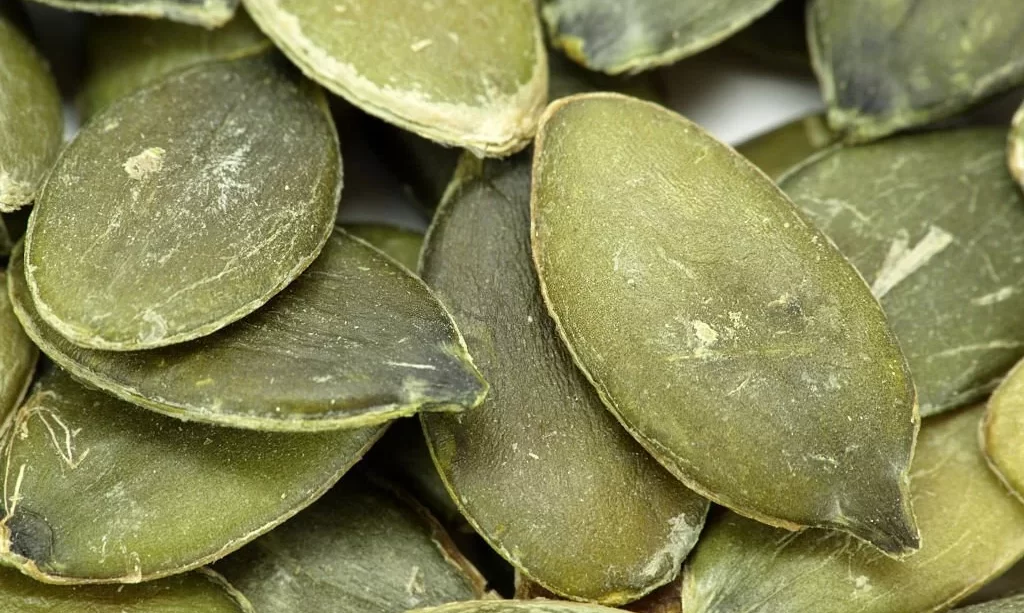Pumpkin seeds, also known as pepitas, are not just a tasty and nutritious snack; they’re also versatile ingredients in cooking and baking. While store-bought pumpkin seeds are readily available, shelling your own pumpkin seeds can be a rewarding and economical way to enjoy this wholesome treat. In this step-by-step guide, we will explore how to shell pumpkin seeds, allowing you to savor the freshness and customize the flavor of your pepitas. Whether you’re carving a pumpkin for Halloween or have a surplus of seeds from a cooking project, learning how to shell pumpkin seeds is a valuable skill that opens up a world of culinary possibilities.
- USDA Organic Pumpkin Seeds
- Batch Tested and Verified Gluten Free
- No Shell & Unsalted
- Non-GMO, Vegan, Paleo & Keto Friendly
- Great For Salads, Homemade Trail Mixes & Granolas, Baked Goods and More!
Gather Your Pumpkin Seeds
Before you embark on the process of shelling pumpkin seeds, you’ll need to gather your seeds. Here’s how to do it:
- Carved Pumpkin: If you’ve recently carved a pumpkin for Halloween or any other purpose, you already have a ready supply of pumpkin seeds. Simply scoop out the seeds from the pumpkin’s cavity using a spoon or your hands.
- Cooked Pumpkin: If you’ve used pumpkin in recipes, such as pumpkin puree or roasted pumpkin slices, you can collect the seeds from the pumpkin flesh you’ve removed. Rinse and clean the seeds thoroughly to remove any remaining pumpkin pulp.
- Store-Bought Pumpkin: If you don’t have fresh pumpkin seeds on hand, you can also purchase raw pumpkin seeds from a grocery store or online. These seeds are typically sold in bags or bulk bins.
- Cleaning the Seeds: Regardless of the source, it’s essential to rinse and clean the pumpkin seeds to remove any traces of pumpkin flesh or pulp. Place them in a colander and rinse under running water, using your fingers to dislodge any clinging debris.
Once you have gathered and cleaned your pumpkin seeds, you’re ready to proceed with shelling them using one of several methods, which we’ll explore in the following sections.
Prepare for Shelling
Before diving into the shelling process, it’s crucial to prepare your pumpkin seeds properly to make the task more manageable. Here’s how to get them ready for shelling:
- Drying the Seeds: After cleaning the seeds, spread them out in a single layer on a baking sheet or a clean kitchen towel. Allow them to air dry for several hours. This step is essential because drier seeds are easier to shell.
- Patting Dry: If you’re in a hurry, you can speed up the drying process by gently patting the cleaned seeds dry with a kitchen towel. Make sure they are completely dry before moving on to shelling.
- Removing Excess Moisture: Any remaining moisture on the seeds can make them slippery and more challenging to shell. Ensuring they are thoroughly dry will streamline the shelling process and yield better results.
Choose Your Shelling Method
When it comes to shelling pumpkin seeds, you have several options to choose from. Each method has its advantages and may be more suitable depending on your preferences and available tools. Here are the three primary shelling methods:
- Traditional Method: This method involves shelling pumpkin seeds by hand. It’s a straightforward approach and requires no special equipment. You’ll use your fingers to crack open the shells and retrieve the inner seeds.
- Boiling Method: The boiling method involves briefly simmering the pumpkin seeds in salted water. This softens the shells, making them easier to crack open. It’s a popular method for those looking to expedite the shelling process.
- Baking Method: Roasting the pumpkin seeds in the oven is another option. This method not only shells the seeds but also enhances their flavor. The heat makes the shells brittle, allowing you to crack them open easily.
In the following sections, we’ll delve into each of these shelling methods in detail, providing step-by-step instructions to help you choose the one that suits your preferences best. Whether you prefer the hands-on traditional method or the convenience of boiling or baking, you’ll soon be enjoying your freshly shelled pumpkin seeds.
Shelling Pumpkin Seeds by Hand
Shelling pumpkin seeds by hand is a traditional and straightforward method. While it may require a bit of patience, it’s a rewarding process that allows you to savor the satisfaction of your efforts. Here’s how to shell pumpkin seeds by hand:
Materials Needed:
- Dried and cleaned pumpkin seeds
- A clean, dry towel or paper towels
- A bowl for collecting shelled seeds
Steps:
- Prepare Your Work Area: Lay out a clean, dry towel or a few layers of paper towels on a flat surface. This will help keep the seeds from rolling away and make cleanup easier.
- Position the Seed: Take one dried pumpkin seed between your thumb and index finger. Hold it securely but not too tightly to avoid crushing the seed.
- Crack the Shell: Use your fingernail or a small, blunt object (like the edge of a butter knife) to apply gentle pressure to the seed’s shell. The goal is to crack the shell without damaging the inner seed.
- Extract the Seed: Once the shell is cracked, carefully pry it open with your fingernail or the edge of the knife. Extract the inner seed and place it in a separate bowl.
- Repeat the Process: Continue this process for each pumpkin seed, one at a time, until you have shelled all the seeds you desire.
- Collect the Shelled Seeds: As you shell the seeds, collect them in a bowl. Discard the empty shells or set them aside for composting.
- Enjoy Your Shelled Pumpkin Seeds: Once you’ve completed the shelling process, you can enjoy your freshly shelled pumpkin seeds as a snack or incorporate them into your favorite recipes.
Shelling Pumpkin Seeds Using the Boiling Method
The boiling method is an effective way to soften the shells of pumpkin seeds, making them easier to shell. Here’s how to shell pumpkin seeds using this method:
Materials Needed:
- Dried and cleaned pumpkin seeds
- A medium-sized saucepan
- Water
- Salt (optional)
- A slotted spoon
- A bowl for collecting shelled seeds
Steps:
- Boil the Pumpkin Seeds: In a medium-sized saucepan, bring water to a boil. If desired, add salt (about 1-2 teaspoons per cup of seeds) to the boiling water. The salt enhances flavor but is optional.
- Add the Seeds: Carefully add the dried and cleaned pumpkin seeds to the boiling water. Allow them to simmer for about 10-15 minutes. The exact cooking time may vary, so monitor the seeds closely.
- Test for Doneness: To check if the seeds are ready, remove one with a slotted spoon and let it cool slightly. Attempt to shell it by cracking the shell between your fingernails. If the shell cracks easily, it’s time to remove the seeds from the heat.
- Drain and Cool: Using the slotted spoon, remove the boiled seeds from the water and place them on a clean, dry towel or paper towels to cool and drain.
- Shell the Seeds: Once the seeds are cool enough to handle, follow the same shelling process as described in the “Shelling Pumpkin Seeds by Hand” section to extract the inner seeds from their shells.
- Collect and Enjoy: Collect the shelled pumpkin seeds in a bowl. Discard the empty shells or add them to your compost pile. Your freshly shelled pumpkin seeds are now ready to enjoy!
Both the hand-shelling and boiling methods are effective ways to shell pumpkin seeds, so you can choose the one that best suits your preferences and available tools. In the following sections, we’ll explore the baking method and provide tips on seasoning and enjoying your shelled pumpkin seeds.
Shelling Pumpkin Seeds Using the Baking Method
The baking method not only shells pumpkin seeds but also enhances their flavor through roasting. Here’s how to shell pumpkin seeds using this method:
Materials Needed:
- Dried and cleaned pumpkin seeds
- Baking sheet
- Cooking spray or oil (optional)
- Salt or desired seasonings (optional)
- A bowl for collecting shelled seeds
Steps:
- Preheat the Oven: Preheat your oven to 300°F (150°C) while you prepare the pumpkin seeds.
- Prepare the Seeds: Place the dried and cleaned pumpkin seeds in a bowl. If desired, you can drizzle them with a small amount of cooking oil or cooking spray for added flavor and crispiness. Season with salt or your preferred seasonings, such as garlic powder or paprika, to taste.
- Spread on a Baking Sheet: Spread the seasoned pumpkin seeds in a single layer on a baking sheet. Use parchment paper or a silicone baking mat for easy cleanup.
- Roast the Seeds: Place the baking sheet in the preheated oven and roast the seeds for about 20-30 minutes. Check them periodically and stir or shake the pan to ensure even roasting. The exact roasting time may vary, so keep a close eye on them.
- Test for Doneness: To check if the seeds are ready, remove one from the oven and let it cool for a moment. Attempt to shell it by cracking the shell between your fingernails. If the shell cracks easily, the seeds are done roasting.
- Cool and Shell: Allow the roasted seeds to cool slightly on the baking sheet. Once they are cool enough to handle, follow the same shelling process as described in the “Shelling Pumpkin Seeds by Hand” section to extract the inner seeds from their shells.
- Collect and Enjoy: Collect the freshly shelled pumpkin seeds in a bowl. Discard the empty shells or add them to your compost pile. Your roasted and shelled pumpkin seeds are now ready to be enjoyed.
Enjoy Your Shelled Pumpkin Seeds
Once you’ve successfully shelled your pumpkin seeds using your chosen method, it’s time to savor the delicious results. Here are some ideas for enjoying your shelled pumpkin seeds:
- Snacking: Eat them as a healthy and satisfying snack. Pumpkin seeds are packed with nutrients like protein, fiber, and healthy fats.
- Salads: Sprinkle shelled pumpkin seeds on salads for a delightful crunch and nutty flavor.
- Trail Mix: Incorporate them into homemade trail mix with dried fruits, nuts, and a touch of chocolate for a tasty on-the-go snack.
- Baking: Add shelled pumpkin seeds to muffins, bread, or granola for added texture and nutrition.
- Seasoned Treats: Experiment with different seasonings like cinnamon and sugar, cayenne pepper, or rosemary and olive oil to create unique flavor profiles.
- Soups and Stews: Use them as a garnish for soups, stews, or chili for an extra layer of flavor and texture.
Conclusion
In conclusion, learning how to shell pumpkin seeds opens up a world of culinary possibilities. Whether you choose the hand-shelling, boiling, or baking method, the result is a batch of freshly shelled pumpkin seeds ready to be enjoyed in a variety of ways. By taking the time to shell your own pumpkin seeds, you can savor their freshness and customize their flavor to suit your tastes.
So, the next time you carve a pumpkin or prepare a pumpkin-based dish, don’t let those seeds go to waste. With the skills you’ve acquired in this guide, you can transform those seeds into a nutritious and delicious snack or ingredient for your favorite recipes. Enjoy your homemade pepitas!





